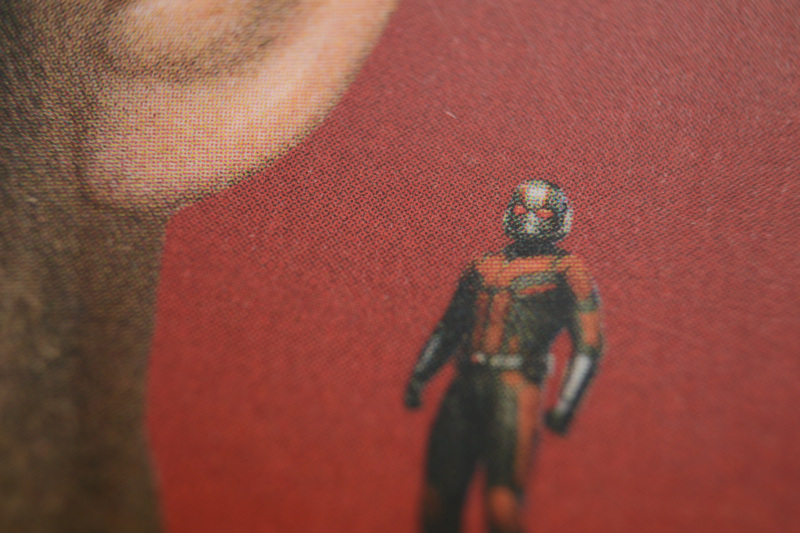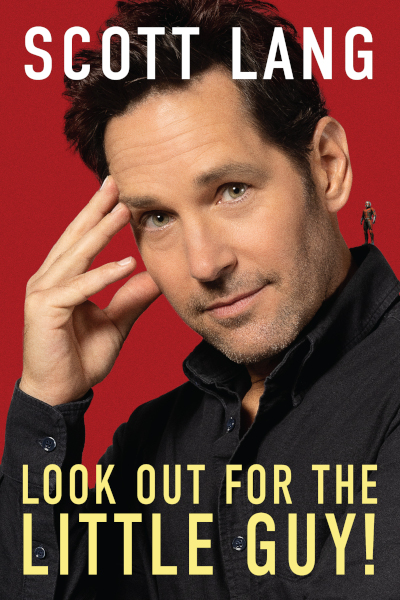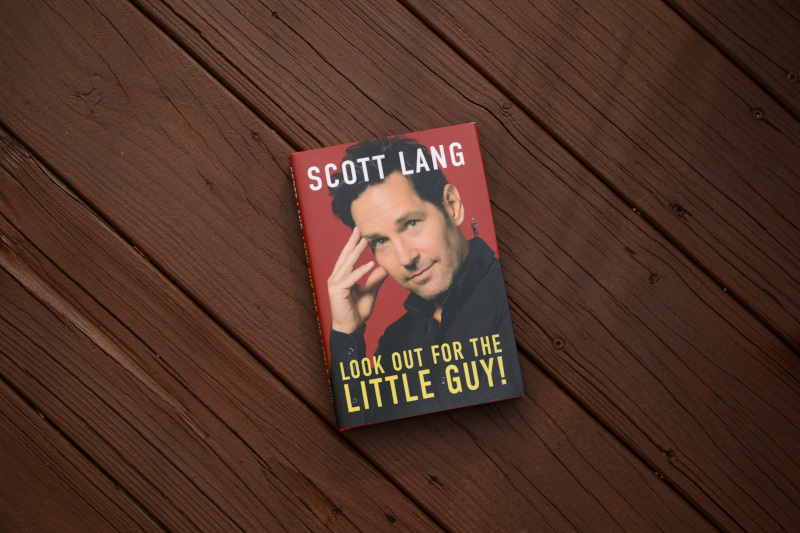
Look Out For the Little Guy! is more than just a superhero memoir; it’s a story of resilience, growth, and ultimately, the power of human connection. Scott Lang, the unlikely hero known as Ant-Man, pulls back the mask and shares his journey from ex-con to father, and ultimately, Avenger. His writing is honest, relatable, and often funny, offering a unique perspective on the superhero experience.
In the Marvel Cinematic Universe (MCU), Scott Lang (Ant-Man) is easily one of the most relatable heroes, perhaps rivaling only Peter Parker (Spider-Man). Scott rarely comes across as confident and sure of himself, but he always tries to do the right thing anyway, even if it’s also the hard thing. That’s why Bruce Banner (The Hulk) and Clint Barton (Hawkeye) asked him to write the official Avengers story to explain to the world what happened when half of the global (universal, even) population vanished without a trace.
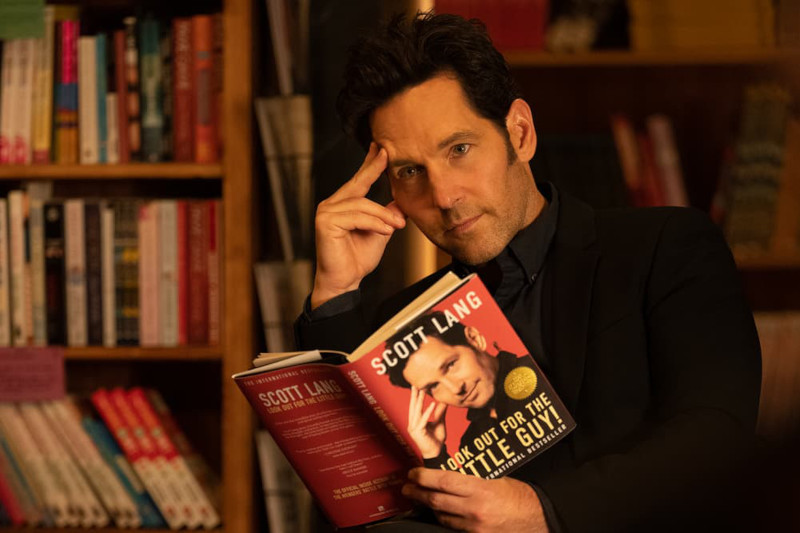
Lang opens his memoir, Look Out For the Little Guy!, with a brief synopsis of his life and career, including Ant-Man’s time with the Avengers. The book is remarkably inspirational: a corporate whistleblower imprisoned for returning stolen money finds his life falling apart, is recruited by world-renowned scientist and inventor Hank Pym, and ends up saving the world (with help).
Lang’s writing style is engaging and conversational, making it feel like you’re having a beer with him and listening to him recount his adventures. He doesn’t shy away from the tough parts, detailing his time in prison and the challenges of balancing his superhero identity with his responsibilities as a father. However, it’s his unwavering optimism and sense of humor that shine through, making even the darkest moments feel relatable and inspiring.
He writes that in a world of big guys and little guys, the former is always stepping on the latter. Sometimes this is by design, but sometimes, just because of their status and drive, the big folks don’t even see the everyday, hard-working folks just trying to get by.
I appreciate the recognition that not all suffering is intentional or even negligent. Some “big guys” simply don’t realize the damage they’re doing. This book draws attention to that and challenges the reader to look out for the little guy!
Because at the end of the day, nobody can tell where life is going to yank them, unexpectedly and seemingly beyond their reach. Steve Rogers signed up to fight, imagining he’d only go as far as a scrawny guy can get in wartime. Tony Stark was brilliant and successful, but I know a part of him wondered if he’d ever get out from under his dad’s shadow. Even Doctor Strange in all his professional success could never have imagined becoming the Master of the Mystic Arts—or even that such a thing existed!
One of the book’s strongest points is Lang’s message of hope and perseverance. He encourages readers to believe in themselves and to always stand up for what is right, no matter how small they may feel. This message is particularly relevant in today’s world, and Lang’s genuine sincerity makes it resonate even more deeply.
While the book is primarily a personal narrative, it also touches on broader societal issues. Lang discusses themes such as social justice, corporate greed, and the importance of family and community. These discussions are woven seamlessly into the narrative, adding depth and meaning to Lang’s story.
Throughout the book, the reader can discover pictures from Lang’s life, along with a F.A.A.M.Q. (Frequently Asked Ant-Man Questions) section after each chapter.
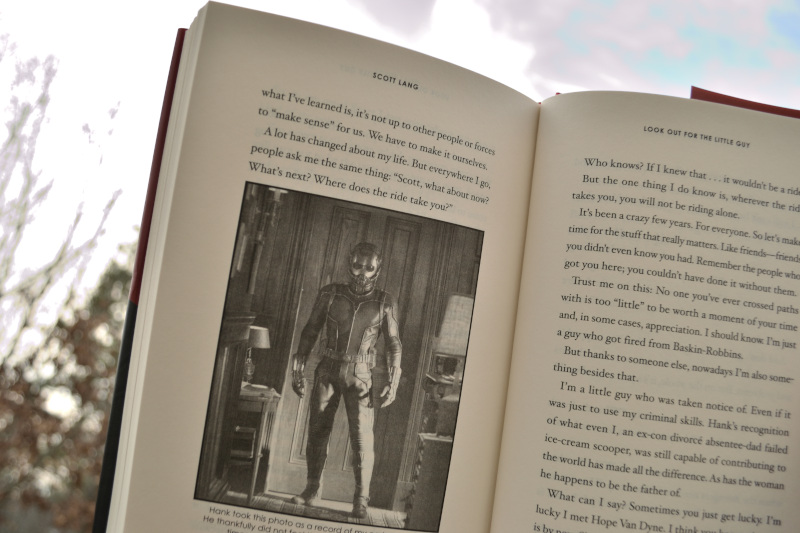
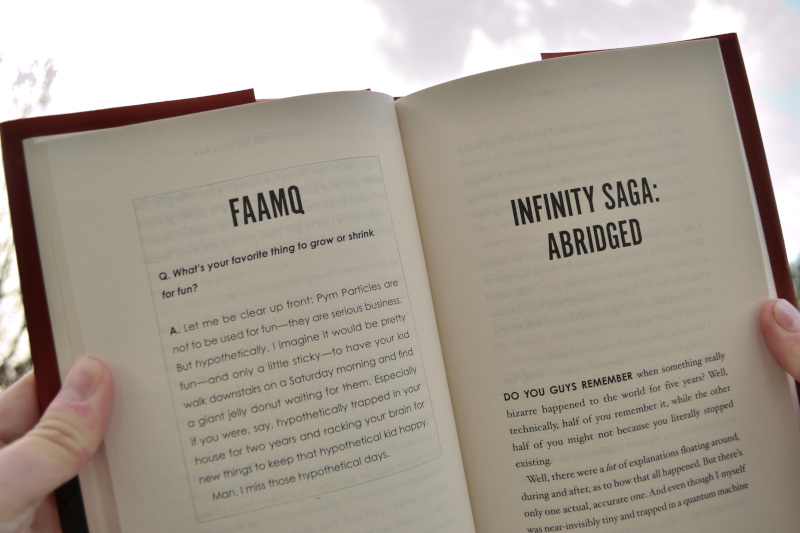
The skill of surviving
Scott Lang describes his feelings of confusion and guilt for being spared “the Snap” upon returning from the Quantum Realm. But rather than dwell on his survivor’s guilt and wallow in self-pity, he decided to focus on the survivor part: I’m good at surviving. How can I bring more of that into the world?
Plenty of real-life people are also good at surviving. They shouldn’t have to be, but they are. Domestic violence. Broken homes. Trafficking. Corruption. Greed. Lust. Survivors are left in the wake of some of the most heinous sins. I’m not suggesting that this book written by a fictional character will heal anyone of a haunting past, but people have drawn inspiration from the pages of comic books for decades. And like I said, this book is remarkably inspirational.
Lang goes on to dismantle the power behind descriptors—words that we, and others, use to describe ourselves. Part of surviving is found in recasting unhelpful descriptors, like “unworthy” or “worst” or “guilty”. During the famous Time Heist, Ant-Man was tasked with recovering the Space Stone, but he ended up losing it to Loki. Hank Pym had previously described Scott Lang as the best thief he’d known, but Scott had lost to an even better thief: Loki, the Norse god of mischief. Lang doesn’t still beat himself up for that, though: …it’s only because Loki was better at stealing. Not that I’m bad at it.
Even when you don’t finish first, or even if you finish last, there’s no reason to doubt yourself.
Be the best of the yous that you can be
During the events of Avengers: Endgame, Scott Lang and team attempt time travel as part of their plan to collect all six Infinity Stones. But their trial runs hit some turbulence along the way when the test subject, Scott, is aged and de-aged in rapid succession. He becomes a teenager, a baby, and an old man within the span of about a minute. But as Lang recalls, those moments presented a breakthrough for him. All of the Alterna-Scotts he encountered were different, but they gave him the clarity to find my way to the right me.
And then Lang gets multiversal.
You already contain so many more versions of you than you can imagine. You just need to locate them, accept their benefits and liabilities, and turn those into the best mixture of yous possible. Because that’s the you that the world needs now.
Conclusion
The book offers a unique perspective on the MCU, seen through the eyes of an “everyman” who finds himself thrust into a world of extraordinary beings. Lang’s descriptions of battles against villains and his interactions with other superheroes are vivid and exciting, offering a glimpse into the world of the Avengers that feels both grounded and fantastical.
Overall, Look Out For the Little Guy! is a compelling and entertaining read. It’s a book that will appeal to fans of Marvel, as well as anyone who enjoys a good story about overcoming adversity and finding the courage to do the right thing.
